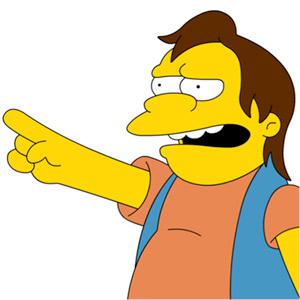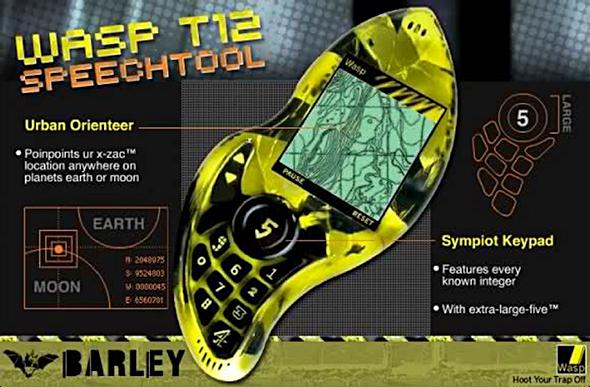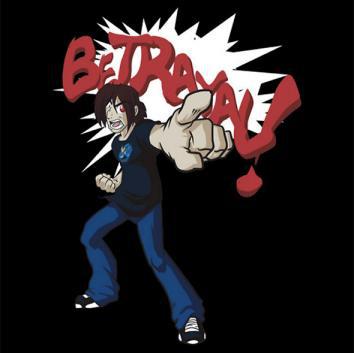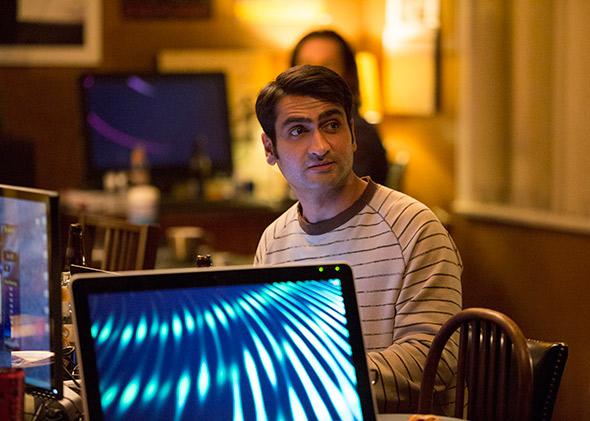Warning! This piece contains spoilers for Silicon Valley.

Courtesy of Fox
The best satire, from Juvenal to Jonathan Swift to Mary Hartman, Mary Hartman to Brass Eye to Veep to Sex House, homes in with laser precision on its target’s weaknesses. Not only does HBO’s new Silicon Valley wield a butter knife instead of a scalpel, but creator Mike Judge (Beavis and Butthead, King of the Hill) is not even operating on the right patient. Instead of pulling back the curtain on startup hype and eviscerating empty techie values, Silicon Valley (Sundays, 10 p.m.) is an upscale Big Bang Theory that gets its laughs from a mural of a Pakistani guy penetrating the Statue of Liberty. This show even forgets to make a joke about Google Plus. (Disclosure: I used to work for Google, and my wife still does.)

Courtesy of trashbat.co.ck
References to Mass Effect 3 and GitHub reveal the show to indeed be set in the present day, though evidence is otherwise lean. There is little reference to other tech companies, large or small, and little of actual tech culture; aside from the Google-like offices of Hooli, Silicon Valley is not identifiably set in Silicon Valley. Consultations with computer scientists resulted in an injection of reasonable-sounding computer jargon but no absorption of Silicon Valley’s actual culture. Judge himself worked for a Silicon Valley firm for a couple of months 25 years ago (in the very same job that also inspired Judge’s superior Office Space), which may help explain why no one on this show browses the Web, tweets, plays video games, or texts. (The Mindy Project has more texting than this show.) It also may help explain why the razor-sharp tech hipster spoof Nathan Barley, from way back in 2005, still feels more contemporary than this rehashed Beavis and Ballmer.
Silicon Valley writer Clay Tarver has said, “When I first read the pilot, I thought maybe it was too harsh.” If Silicon Valley is harsh, then Brooklyn Nine-Nine is Serpico. Harsh would be tech billionaire Peter Thiel plotting to build a private offshore nation on the one hand while building government surveillance tools with his company Palantir on the other. Harsh would be Zynga ex-CEO Mark Pincus doing “every horrible thing in the book just to get revenues” (his words), then extorting stock options from his own employees. Harsh would be Sony installing viral rootkits on their customers’ desktops to prevent them from ripping CDs. Harsh is anything having to do with Something Awful or 4chan. There is an abundance of ripe and ready targets, none of which the show sees fit to mention.
The setup is that young, callow genius Thomas (Thomas Middleditch) inadvertently discovers the holy grail of compression algorithms while working for a tech titan called Hooli. He leaves to found his startup, Pied Piper, with a couple of friends, while billionaires Peter Gregory (the late Christopher Evan Welch, playing a Peter Thiel/Elon Musk investor) and Gavin Belson (the ever-sleazy Matt Ross as a Steve Jobs/Larry Page CEO) use Pied Piper as a pawn in their own rivalry. But instead of vicious satire, we get jokes about bad teleconferencing latency, apps named NipAlert, and that old standby, the hilarious drug vision trip.
Instead, we’re stuck with the paint-by-numbers trials and travails of five friends torn between success and one another, because this is a satire with heart. (It tests well.) Instead, we get jokes about how biz-dev guy Jared (Veep’s Zach Woods) sang a cappella at Sarah Lawrence—because he’s a wimp, you see! Instead, we get a lame subplot where a Latino street artist (named Chuy, possibly as a loose reference to the great David Choe, who got rich doing murals for Facebook) is hired to do a logo for Pied Piper and does a mural of Kumail Nanjiani (as Dinesh) in Aztec costume having sex with the Statue of Liberty. Edgy.
The recurrent themes—that people want money and will sell one another out in stupid ways while deceiving themselves into thinking they’re good people—are nothing new and hardly specific to the setting. Since satire only gains its viciousness from knowing particularity, the show fires one-size-fits-all blanks. The show briefly teases on Google’s “Don’t be evil” motto but ignores the far wider target of Ayn Rand–style techno-libertarianism, possibly because Judge himself is a pro-gun libertarian who didn’t sing a cappella at Sarah Lawrence.
The conservative mindset extends to the demographics. My colleague Willa Paskin excuses Silicon Valley’s lack of women beyond strippers, escorts, and secretaries because the real Silicon Valley also has a woman problem, so apparently it’s “art imitating life.” The female software engineer watching this show with me disagrees (and asks if we can watch Broad City instead—I wish). There are in fact many technical and powerful women in Silicon Valley, many of whom are eminently mockable. (Names provided on request.) This show doesn’t satirize Silicon Valley’s gender imbalance; it perpetuates it.
Adding to the sense of waste is the high quality of acting talent. Martin Starr (as Gilfoyle) and Nanjiani, in particular, are perfect deadpan snarkers who can elevate pretty tepid lines. Starr had vastly better geek material on the brilliant sitcom Party Down, where he played a bitter and untalented science fiction writer. Nanjiani has way better material in his own stand-up act, as when he talks about having to gun his way through his hometown of Karachi in Call of Duty. (Can we get him to write an episode?) Having seen the sorely underused Zach Woods do improv, I can vouch for the fact that he knows more about Dungeons and Dragons than Silicon Valley’s writing crew. And I’ve been to real Silicon Valley parties that were funnier than the by-the-numbers frat-boy toga party in the fourth episode.
The sharpest moment in the series so far comes in the second episode, when Dinesh and Gilfoyle boast about their skills and critique each other. Gilfoyle is the disheveled systems hacker who knows the nuts and bolts of hardware and Linux, while Dinesh is the clean-cut theoretical scientist who can write brilliant algorithms but is loath to get his hands dirty with system administration. This is, in fact, a very real divide between two different strains of engineers, and Nanjiani and Starr are, for that scene, convincing representatives of each type. Too bad that divide is never subsequently addressed, but props to whoever squeezed that in between all the dick jokes.

Courtesy of @th3engineer via RedBubble
“To be a target of humor is an honor,” said T.J. Miller, who plays the obnoxious Steve Jobs wannabe Erlich as though he’s auditioning for The Hangover Part IV. (He’s the one who gets the drug trip.) To be a target of good humor is an honor, but to be the target of this wayward, lukewarm pablum is, to cite a meme, a BETRAYAL—and let me assure you that to be the target of this review is not an honor. Because I’m a software engineer, Silicon Valley might portray me with my pants up to my armpits, nerdily and nasally complaining that Thomas’ compression algorithm is impossible or that nine times F in hexadecimal is 87, not “fleventy five” (as Erlich says), but I would forgive such slips in a second if the show were funny.
Office Space resonated with people because it nailed many of the tiny details of office life, and you could tell Judge knew them well. Reusing that same job experience for Silicon Valley, rather than actually investigating tech culture, smacks of laziness. Judge didn’t do his research when parodying lefties in his awful bomb The Goode Family, and he didn’t do it here.
The missed opportunities bring to mind Napoleon at Waterloo. I dream of what could have been had the show been in the hands of Rick and Morty’s Justin Roiland, Don’t Trust the B—- in Apartment 23’s Nahnatchka Khan, or especially Better Off Ted’s Victor Fresco. I suppose Silicon Valley could become a hit with people who thought that Judge’s Idiocracy was a searing Voltairean indictment of modern society [Editor’s note: People like me!] rather than the lazy potshots of a self-satisfied Nelson Muntz who stopped learning anything new after he decided he was smarter than everyone else. Now Judge has made something that is indeed better than The Big Bang Theory—but not by much. In Idiocracy, the plebes of the future watched the self-explanatory “Ow! My Balls!” (a joke stolen from The Simpsons’ “Man Getting Hit By Football”). In the real Idiocracy, the self-proclaimed cognoscenti will be watching Silicon Valley and making fun of people who like The Big Bang Theory.
Attention Hollywood: My fees for technical and creative consultancy on television shows are quite competitive.
